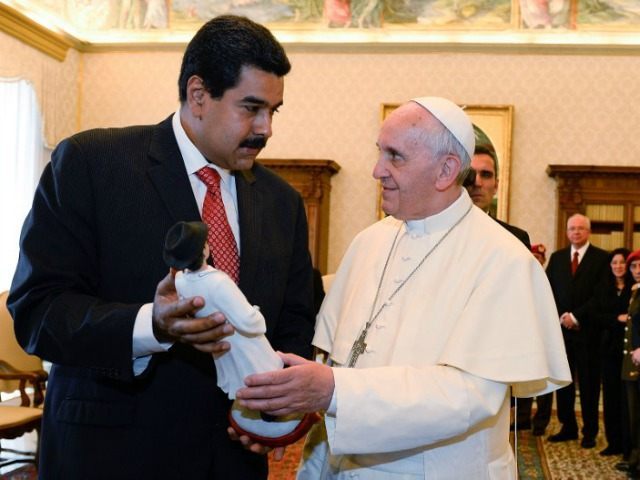Venezuelan President Nicolás Maduro, facing a tidal wave of international criticism over human rights violations and hunger strikes by his nation’s most famous prisoners of conscience, canceled a visit to the Vatican to meet with Pope Francis. Both dissidents and Vatican sources have told multiple Spanish newspapers that the cancelation, ostensibly due to a “cold,” actually occurred out of fear of being embarrassed on a public stage.
“The doctors have forced me to stay resting and that is what I am doing,” Maduro said on Venezuelan state television this week, excusing his absence from the Vatican on Sunday. “I lament it very much, but, well, because of this huge cold I have gotten and a strong otitis [ear inflammation], the doctors have forbidden me from getting on a plane and going on a trip with these characteristics,” he concluded.
Both the right-wing Spanish newspaper ABC and left-wing El Pais have published reports claiming Maduro was not, in fact, infirm, but merely wanted to avoid the embarrassment potential of having Pope Francis scold him for his government’s myriad human rights violations. ABC cites the ex-governor of the Venezuelan state of Zulia writing on his blog that he “sincerely believe[s] that Maduro stood up the Pope out of fear towards the clear pontifical position on liberty, democracy, and, especially, human rights. … I think he did it out of fear of a new embarrassment of historical proportions that would go around the world in seconds.”
Vatican sources tell El Pais a similar story. Vatican officials reportedly believe the cold was “an excuse to avoid Francisco personally requesting the freedom of political prisoners.” One official told El Pais that the Vatican is stunned that Venezuela has “not issued even a gesture of distension: not the liberation of one prisoner, not even the possibility of external mediation.” The official added, “We would have never imagined that, while the US and Cuba become closer, the situation in Venezuela would become more complicated.”
Leader of the Popular Will opposition party, Leopoldo López, and San Cristóbal Mayor Daniel Ceballos, both imprisoned on vague charges of disturbing the public, began hunger strikes on May 24 and 22, respectively. In addition, two 29-year-old Venezuelans–Martín Paz y José Vicente García–traveled to Rome to begin a hunger strike there in solidarity with the prisoners to bring awareness internationally to the struggles of the Venezuelan people. Maduro has responded to the hunger strikes by calling the protesters “extremists” who are committing actions “that are irrational and have nothing to do with the Constitution or doing politics in the country.”
Miranda state Governor Henrique Capriles Radonski, who ran against Maduro twice for the nation’s top political position and lost in questionable circumstances, sent a personal letter to Pope Francis in anticipation of his now-canceled meeting with Maduro, urging the Pope to appeal on behalf of the protesters.
Pope Francis and his officials have expressed concern about the human rights violations of the Maduro regime in Venezuela in the past, including the imprisonment of hundreds of peaceful protesters, as well as allegations of torture, beatings, and extrajudicial killings of alleged protesters as young as 14 years old. “There are many things that he [Pope Francis], as well as people outside of our country, cannot understand, like how an immensely rich nation like Venezuela can be so immensely poor,” said Monsignor Roberto Lückert León regarding the situation. León noted that Pope Francis was indeed interested in “telling President Maduro what he thinks should be done in the case of Venezuela.”
Venezuelan Vice President Jorge Arreaza has told media that Maduro will reschedule his meeting with Pope Francis in the coming months.

COMMENTS
Please let us know if you're having issues with commenting.